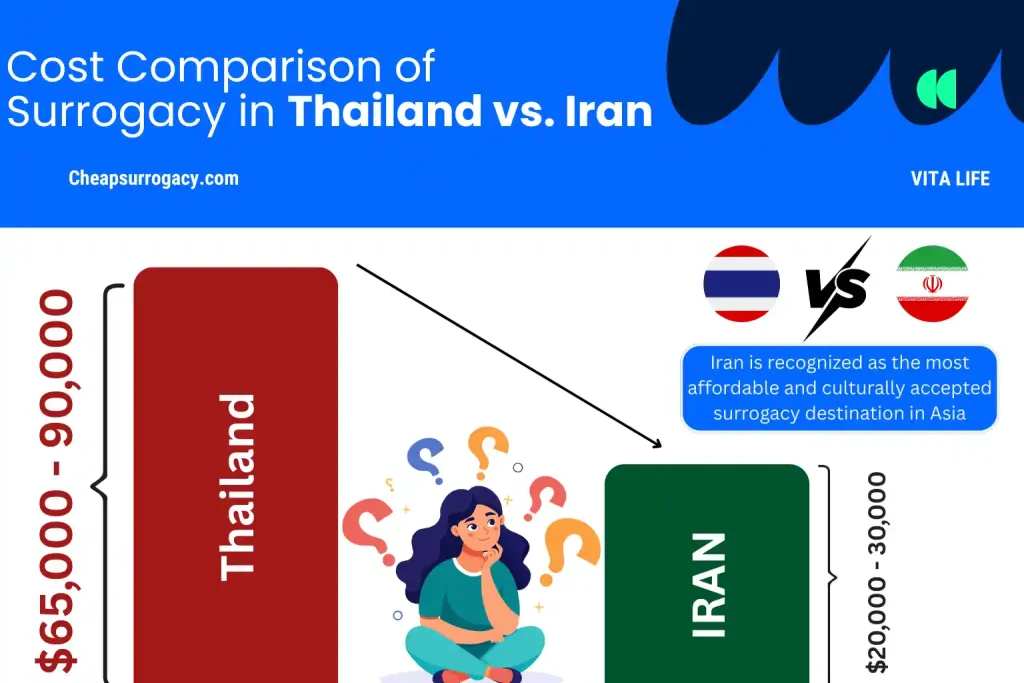Picture this: You’re a couple in Bangkok, grappling with infertility, scrolling through forums under the glow of your phone, dreaming of surrogacy as the key to the family you’ve always wanted. Thailand seems like the perfect spot—world-class clinics, tropical vibes, and a booming medical tourism scene. But as you dig deeper into surrogacy in Thailand, the dream hits a wall. Is surrogacy legal in Thailand? Short answer: It’s tightly restricted, accessible only in limited altruistic forms for locals and barely open to foreigners. Drawing from the latest insights as of October 2025, this piece demystifies surrogacy laws in Thailand and highlights why Iran stands out as a reliable, cost-effective alternative for Thai families on this journey.

Thailand Surrogacy Law 2025
Is surrogacy legal in Thailand? It’s a tricky one that catches a lot of people off guard—I’ve seen questions pop up in travel forums where folks assume it’s wide open like in some other spots. Bottom line: yes, but strictly altruistic, meaning no commercial deals, just covering medical costs and nothing more.
The 2015 Protection of Children Born Through Assisted Reproductive Technologies Act shut down all paid surrogacy, restricting it to married heterosexual Thai couples (or where one is Thai and they’ve been wed at least three years) who can prove infertility through docs.
The surrogate has to be a blood relative, married with her spouse’s consent, and already a mom herself. No extra cash allowed—it’s meant to stay family-focused and ethical, though debates rage on how “ethical” that really is in practice.
Fast forward to 2025, and the Marriage Equality Act (effective Jan 23) shook things up by legalizing same-sex marriage, which indirectly ties into this. The Ministry of Public Health has draft proposals out there to include those couples in surrogacy eligibility, but as per Bangkok Post pieces from around May, nothing’s finalized. It’s in review mode, creating uncertainty all around.
For foreigners, it’s still a no-go zone mostly—heavy regulations, residency requirements, and zero shortcuts. That 2014 Baby Gammy scandal (where an Aussie couple left a surrogate with a Down syndrome baby) was the catalyst for the crackdown, and clinics are still wary, avoiding any gray areas. Thailand surrogacy law for foreigners in 2025 still keeps things restricted, and it remains difficult for those seeking surrogacy options in the country.
For Thai locals, it’s no picnic: no willing relative means you’re stuck, no alternatives. IVF here is top-notch and accessible, with cycles costing €3,000-€6,000 based on clinics like the ones in central Bangkok I’ve looked into. Surrogacy, though? Drowned in bureaucracy that can drag on forever. Foreigners run into even higher barriers—no dedicated visas, no bilateral agreements to ease things.
This year’s MOPH updates suggest possible openings for internationals amid the equality push, but it’s early days—still drafts, not law. A fertility specialist in Nation Thailand summed it up: “We’re evolving, but slowly—patient safety first.”
Compared to places like Georgia or Kazakhstan, where internationals head for affordable commercial options (I’ve read accounts of couples cutting costs in half), Thailand’s rules keep it isolated—no “surrogacy tourism” vibe here. If you’re considering it, consult a Thai lawyer soon; regulations can change with elections or policy shifts, and getting advice tailored to now is key.

Thailand Surrogacy Requirements
Navigating surrogacy thailand legal requirements is no small feat. To qualify under surrogacy laws in Thailand:
You must be a legally married couple (heterosexual or same-sex as of 2025), with at least one Thai partner married for 3+ years.
Proof of infertility is mandatory, verified by a licensed clinic.
The surrogate must be a close relative (sister, cousin, etc.), aged 20-35, with one healthy child and spousal approval.
No commercial payment—only medical and reasonable living expenses are covered.
Foreigners need Thai residency or a Thai spouse, with extra embassy approvals for child registration.
Single parents or non-residents? You’re excluded. Even for eligible Thais, the family-tie rule is a dealbreaker for most, pushing couples to look abroad.
How Surrogacy Works in Thailand
If you meet the strict surrogacy thailand legal criteria, how does surrogacy in Thailand work? Approved clinics in Bangkok or Phuket facilitate altruistic gestational surrogacy, matching you with a vetted relative (20-35 years old, screened for health). The process spans 12-18 months:
IVF Phase: Starts with in-vitro fertilization (55-65% success rate per cycle), costing €3,000-€4,000 per attempt.
Embryo Transfer: Once successful, the embryo is transferred to the surrogate.
Pregnancy: Nine months of monitored prenatal care, with costs covered by intended parents.
Birth and Registration: For eligible Thais, the child is registered to the intended parents, but foreigners face delays with passports and visas.
The catch? Without a willing relative, the process stalls. Even then, inconsistent clinic standards and bureaucratic hurdles can derail plans, especially for internationals navigating exit protocols.
Surrogacy Prices in Thailand
What about surrogacy prices in Thailand? While Thailand’s IVF is affordable, surrogacy in Thailand is pricier than expected due to restrictions. Total costs range from $65,000-$90,000, covering:
IVF cycles (€3,000-€4,000 each, often multiple tries).
Medical and prenatal care for the surrogate.
Legal fees and paperwork (especially for foreigners).
Travel and logistics (hotels, visas for non-residents).
Compared to pre-2015, when Thailand was a surrogacy hub, today’s costs are steep—driven by limited access and hidden fees. It’s competitive with Asia but far from a bargain, especially when legal risks loom large.

Surrogacy Agencies in Thailand
You might stumble across surrogacy agencies in Thailand promising quick fixes, but beware: Most operate in legal shadows. The 2015 ban on commercial surrogacy shut down legitimate agencies, leaving underground players that skirt surrogacy thailand law. These groups often charge hefty fees ($10,000-$20,000 upfront) with no guarantee of success, risking legal battles or child registration issues. Experts warn: It’s a gamble not worth taking.
Instead, Thai couples are turning to regulated markets like Iran, where agencies like Hood Services offer transparent, ethical support at a fraction of the cost.
Advantages of International Surrogacy for Thai Residents
When surrogacy in Thailand hits a dead end, where is surrogacy legal in Asia? Options like Georgia ($30,000-$50,000, commercial and foreigner-friendly), Kazakhstan, or Russia beckon, but India’s 2021 ban and Laos’ unregulated scene are no-gos. Iran shines as the standout. A quick flight from Bangkok (under six hours), Iran has woven surrogacy into its legal fabric since the 2000s, backed by Shia ethics as a humane infertility fix. Unlike surrogacy thailand legal constraints, Iran’s framework is open to foreigners and far more affordable.
Iran’s edge:
Cost: $14,000-$16,000 all-in (vs. Thailand’s $65k-$90k), covering IVF, surrogate support, and legals.
Legality: Fully regulated for heterosexual married couples (20-50 for women, up to 60 for men) with infertility proof.
Process: IVF in top Tehran/Isfahan clinics (65%+ success), 9-month pregnancy, total 12-26 months.
Parental Rights: You’re legal parents at birth—no surrogate claims. Easy child registration and exit in days.
Surrogate Vetting: Women 18-40, with one child, spousal consent, and full health/psych screens. Pay capped at $8,000-$12,000, ethically overseen.
Hood Services streamlines it for Thais: Visas, English-speaking doctors, and cultural bridges. A Bangkok couple raved: “Iran turned Thailand’s roadblocks into our path to parenthood—affordable and stress-free.”
Final Thoughts
Surrogacy in Thailand and its rigid surrogacy thailand legal verdict may clip your wings, but Iran’s open skies await. With ironclad laws, ethical heart, and costs slashing Thailand’s by over half, it’s the pivot point for Thai parents ready to soar. Why wrestle with bans when affordability beckons? Connect with Hood Services—craft your happy ending, one heartbeat at a time.

Frequently Asked Questions
Is surrogacy legal in Thailand?
Yes, but only altruistic surrogacy for married Thai couples (or those with a Thai spouse of 3+ years) using a relative surrogate—no commercial options.
is surrogacy legal in thailand 2025?
In 2024, it was limited as above; 2025 amendments added same-sex eligibility but kept foreign access tightly restricted.
Is surrogacy legal in Thailand for foreigners?
Not fully—foreigners need Thai residency or a Thai spouse, with heavy oversight. Reforms are pending but not active in 2025.
Where is surrogacy legal in Asia?
Top spots: Iran (commercial, foreigner-friendly, $14,000-$16,000), Kazakhstan (commercial, open to foreigners), Georgia (commercial, on the Asia-Europe border). Emerging options: Malaysia (limited, evolving laws), Laos (unregulated, risky).
